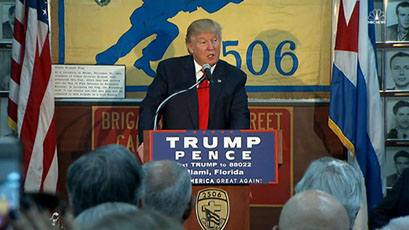
Much Ado About Cuba
Trump’s speech didn’t offer many specifics, nor did the accompanying White House statement, though guidelines issued by the Treasury Department fill in the gaps. They make clear that the proposed changes will not go into effect for several months, after administrative rules are issued. And there’s been little reaction from Cuban Americans. According FIU poll last year, nearly 70% approved of President Obama’s engagement with Cuba, and 63% opposed the embargo.
for several months, after administrative rules are issued. And there’s been little reaction from Cuban Americans. According FIU poll last year, nearly 70% approved of President Obama’s engagement with Cuba, and 63% opposed the embargo.
The keystone of Obama’s deal with Cuba was the normalization of relations with an exchange of ambassadors and embassies (which had previously been called “Interests Sections”). Surprisingly, this was affirmed by Trump, as was Cuba’s removal from the list of state-sponsored terrorists, the elimination of Bush-era restrictions on Cuban family visits and remittances, and ending “wet foot, dry foot.”
What’s new is the ban on doing business with GAESA, a conglomerate of companies controlled by the Cuban armed forces. Following the Chinese model, the military is deeply embedded in the Cuban economy and controls more than half of the tourism industry. GAESA has a stake in many of the hotels and tourist spots in Old Havana, including Hemingway’s favorite bar, the Floridita. Presumably, American visitors would have to go elsewhere. But how to untangle GAESA’s complex portfolio? There is no way of knowing which properties it actually controls, and nothing prevents the Cubans from transferring these properties into other government entities not run by the military.
The other change relates to travel. Tourism remains illegal, but Obama allowed Americans to self-declare that one of 12 approved categories applied to their trip. The broadest was “people-to-people,” which meant you were promoting friendly relations with Cubans, which is easy enough to do. For the past year, American travelers had no need to apply for permission to visit Cuba and could get their visas at the airline counter. It will now be required for “people–to-people” travelers to join a licensed group, as before. But Americans can still self-declare for the other 11 categories, such as education, religious activities, and professional research.
Trump also claimed that his proposal would increase human rights in Cuba, but it could hurt nascent Cuban entrepreneurs, the cuentapropistas who rent out their apartments via Airbnb or run paladares, the often delicious home-style restaurants. For logistical reasons, a licensed group will probably stay at a government-run hotel.
Last year, 614,433 Americans visited Cuba last year, including 329, 496 Cuban Americans. The biggest potential losers are airlines like Southwest, JetBlue and American, which depend on “people-to-people” travelers to fill their daily fights to the island. Curiously, they’ve been hesitant to promote Cuban getaways, perhaps fearing political fallout, and most Americans have no idea how easy it has been to go. Trump’s changes may add to the confusion and discourage them from visiting.
It can also be argued that Trump has strengthened the position of hardliners in Cuba who opposed rapprochement. Raul will be retiring at year’s end, and it’s unclear who will succeed him. For his big brother Fidel, the embargo was always a convenient excuse, allowing him to play the victim and blame Cuba’s woes on exiles in Miami. Some Cuba watchers fear that these changes, and the role played by Rubio, play perfectly into that narrative.
Rubio was eager to take credit for all this and reportedly described his hush-hush negotiations with the White House as “Operation Marti.” Revered as the Apostle of Liberty, José Marti was an idealistic poet turned revolutionary who gave his life for Cuban independence in 1895. By the time Rubio appeared on Meet the Press the Sunday following Trump’s speech, Cuba was once more on the backburner and all the questions were about Russiagate.